
The Aladdin Deck Enhancer is a system-enhancing adaptor to use Compact Cartridges on the Nintendo Entertainment System. It was produced by Camerica and developed by Codemasters but not licensed by Nintendo. It is similar to the Datach system for the Famicom, but without the Barcode feature. It was released in November 1992, with its planned library to reach a total 24 games by the end of 1993. However, only seven games were actually released. The device had low sales and Camerica went bankrupt in 1993.

Treasure Island Dizzy is a puzzle video game published in 1989 by Codemasters for the Amstrad CPC and ZX Spectrum, and later ported to the Commodore 64, NES, Amiga, Atari ST and Atari Jaguar.
Andrew Nicholas Oliver and Philip Edward Oliver, together known as the Oliver Twins, are British twin brothers and video game designers.
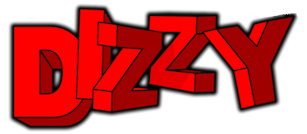
Dizzy is a series of video games, created by the Oliver Twins and published by Codemasters. It was one of the most successful British video game franchises of the late 1980s and early 1990s. Originally created for the ZX Spectrum and Amstrad CPC, the series appeared on multiple home computer and video game console formats, with over a dozen games being published between 1987 and 1992.
In video game parlance, a multicart is a cartridge that contains more than one game. Typically, the separate games are available individually for purchase or were previously available individually. For this reason, collections, anthologies, and compilations are considered multicarts. The desirability of the multicart to consumers is that it provides better value, greater convenience, and more portability than the separate games would provide. The advantage to developers is that it allows two or more smaller games to be sold together for the price of one larger game, and provides an opportunity to repackage and sell older games one more time, often with little or no changes.

The Codemasters Software Company Limited is a British video game developer and former publisher based in Southam, England, which is a subsidiary of American corporation Electronic Arts and managed under the EA Sports division. Founded by brothers Richard and David Darling in October 1986, Codemasters is one of the oldest British game studios, and in 2005 was named the best independent video game developer by magazine Develop. It formerly also published third-party games.
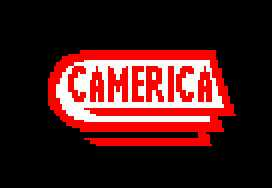
Camerica was a Canadian video game company founded in 1988. It released various unlicensed video games and accessories for the Nintendo Entertainment System, such as the Game Genie, and was the North American publisher for British developer Codemasters.
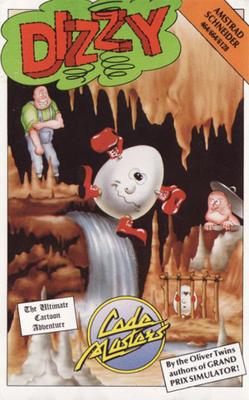
Dizzy – The Ultimate Cartoon Adventure is an adventure-platform game, the first video game featuring the character Dizzy, an anthropomorphic egg. The game was designed by two British brothers, the Oliver Twins. Dizzy was published by Codemasters and was released in 1987.

Fantastic Dizzy is a 1991 video game developed by Codemasters. It is part of the Dizzy series. It was published on several platforms, including Mega Drive/Genesis, Master System, Game Gear, Nintendo Entertainment System, Amiga, and MS-DOS.
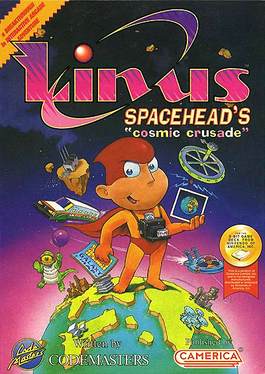
Linus Spacehead's Cosmic Crusade is a video game released in 1992 by Codemasters for the Nintendo Entertainment System. A remake of the game, retitled Cosmic Spacehead, was released in 1993 for Amiga, MS-DOS, Game Gear, Master System, and Genesis. The game features adventure elements, with locations connected by platform sections.
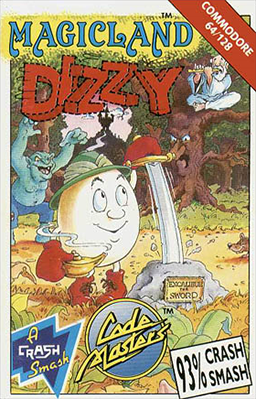
Magicland Dizzy is a platform adventure game published in Europe in 1990 by Codemasters for the ZX Spectrum, Commodore 64 and Amiga platforms. By 1992 there were also MS-DOS, Atari ST and Amstrad CPC versions available. It is the sixth game in the Dizzy series, and the fourth adventure-based Dizzy title. The story, set in a fantasy world called Magicland, follows on from the events of Fantasy World Dizzy, the previous adventure title. In Magicland Dizzy the player controls Dizzy, an egg-shaped character, who is trying to save six of his friends who have been placed under spells by the Evil Wizard Zaks.
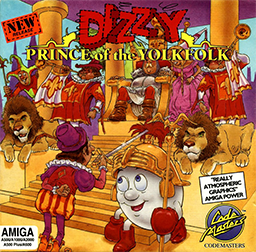
Dizzy: Prince of the Yolkfolk is an adventure video game published in December 1991 by Codemasters for the Amstrad CPC, Atari ST, Commodore 64, ZX Spectrum, MS-DOS, NES and Amiga. It was the sixth game in the Dizzy adventure series. Initially it was only released as part of the Dizzy's Excellent Adventures compilation. The creators of the series, the Oliver Twins, outsourced the video game company Big Red Software to design and develop the game. The game interface and mechanics resemble those of Magicland Dizzy, discarding changes introduced in the fifth game.

Dizzy Panic is a puzzle video game published in 1990 by Codemasters for the Amstrad CPC, ZX Spectrum, Commodore 64, Master System, and Game Gear. The game is based on the Dizzy series and was designed by the Oliver Twins but was developed by Big Red Software. Gameplay involves moving a wall left and right so that falling shapes pass through the appropriately shaped holes in the wall.

Spellbound Dizzy or Dizzy 5 is an adventure video game, featuring the character Dizzy, released in November 1991 by Codemasters. The series was originally developed by the Oliver twins but they had little involvement with this title other than executive sign-off, leaving Big Red Software to redesign the graphics engine and design the game and puzzles.
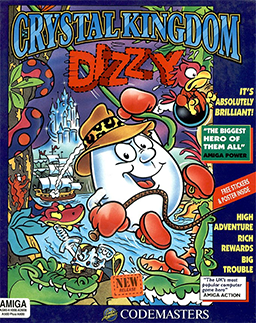
Crystal Kingdom Dizzy is an adventure video game featuring the character Dizzy released in December 1992 by Codemasters. The Oliver Twins – who were heavily involved in the design and programming of previous Dizzy games – had less involvement with this one.

The Lion King is a 1994 platform game based on Disney's 1994 animated film of the same name. The game was developed by Westwood Studios and published by Virgin Interactive Entertainment for the Super NES and Genesis in 1994, and was ported to MS-DOS, Amiga, Game Gear, Master System, and Nintendo Entertainment System. The Amiga, Master System, and NES versions were only released in the PAL region. It is the final licensed NES game worldwide. The game follows Simba's journey from a young cub to the battle with his uncle Scar as an adult.

M2 Co., Ltd. is a Japanese video game developer and publisher, best known for handling emulation of re-released games, such as some Sega Ages titles, Virtual Console titles for Nintendo systems, the 3D Classics series for the Nintendo 3DS and their ShotTriggers range of classic STG games. M2 has also created entirely new titles such as WiiWare games for Konami under the ReBirth moniker and more recently a new GG Aleste game. In addition, M2 currently holds the rights of Aleste series and all NEC Avenue and NEC Interchannel games on TurboGrafx-16 and variants, previously owned by Lightweight.
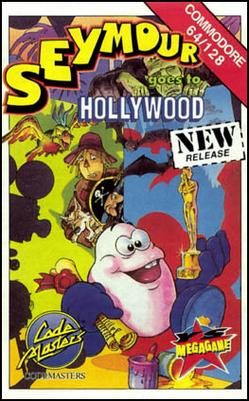
Seymour Goes to Hollywood, also known as Seymour at the Movies, is a platform and adventure game developed by Big Red Software and originally published in Europe by Codemasters in 1991. Players control Seymour, a small potato-like creature who wishes to be a film star. The film's script has been locked in a safe, meaning Seymour must solve puzzles by collecting and using objects scattered throughout the game in order to progress, ultimately retrieving the script and allowing filming to start.
Quattro is a series of video game compilations released in the 1990s. They consisted of games developed by Codemasters. The NES versions were released as multicarts and were published by Camerica without a license by Nintendo.

















